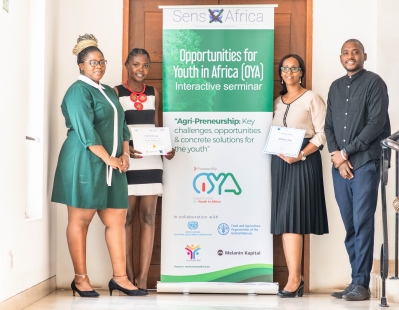Africa harbors the youngest population worldwide in terms of average age, with 70% of sub-Saharan Africa’s population being under the age of 30. However, the dire employment situation hinders the continent to fully incorporate the potential of the energetic workforce, creating a fruitful ground for youth unemployment.
#InternationalYouthDay
Africa has the youngest population in the world, with 70% of sub-Saharan Africa under the age of 30. To achieve SDG #6 on clean water and sanitation for all, we need to leverage the full potential of all generations, everywhere.
📹: WaterAid Uganda pic.twitter.com/bKhqTxJspN— WaterAid East Africa (@WaterAidEA) August 12, 2022
Because of that, most of Africa’s youth resort to informal work, many are underemployed or remain in poverty despite having work due to a weak social safety net and low wages. According to the African Development Bank, the youth face roughly double the unemployment rate of adults, varying from country to country.
However, if properly supported and effectively integrated into the job market, it is the African youth that has the potential to transform Africa’s economy sustainably.
Naomi Ruhara, an indigenous vegetable farmer, explains that she has come to learn that agribusiness has the potential to create a variety of jobs and opportunities: “If youth are trained on agribusiness I think they will gain more interest in it.” She encourages the youth to involve themselves in agribusiness as it can sustain the economy and improve individual and societal livelihoods.
Agribusiness indeed holds considerable potential in providing gainful employment opportunities for African youth and presents a first step towards a structural transformation of developing countries’ economies. It can enable poverty reduction through the strengthening of entrepreneurial ecosystem and self-employment, has the potential to mitigate climate change through sustainable production practices and new technologies as well as enhance economic competitiveness and integration into regional and global supply chains.
Related Articles: Involving the Youth in Decision-Making Processes | Creating a New Social Contract for a Healthy, Just and Sustainable World
Because of its vast agricultural potential, Africa’s agribusiness sector is expected to reach US$1 trillion by 2030, fueling the motor of sustainable and inclusive growth. For that reason, growing political commitments can be observed across Africa to engage youth in agribusiness. Adding to the commitments, many African governments and development partners started focusing on various interventions to increase youth engagement, such as skills development, access to resources, and provision of new technologies. These developments could help increase innovation among the youth and attract them toward agribusiness.
UNIDO’s contribution in accelerating youth employment in agribusiness
At the 2019 Tokyo International Conference on African Development (TICAD), the United Nations Industrial Development Organization (UNIDO) and the Food and Agriculture Organization of the United Nations (FAO) officially launched a joint programme, named “Opportunities for Youth in Africa (OYA): Accelerating job creation in agriculture and agribusiness,” to accelerate efforts in the area of job creation for African youth, especially through agribusiness and entrepreneurship development.

The objective of the programme is to increase decent employment opportunities in the agricultural and agribusiness sector for youth through individual skills and competencies training, the strengthening of agricultural value chains, and the reinforcement of institutions in supporting youth employment creation and entrepreneurship development.
The OYA programme is a unique solution for boosting creativity and productivity by expanding horizons of opportunities and offering groundbreaking technologies and skills to young people hungry to learn, grow and become actors of change in their own countries and on the continent at large. Through demand-driven technical and vocational trainings, work-based learning and skill-enhancement courses, OYA accompanies young and aspiring entrepreneurs in turning their business ideas into sustainable and bankable business models.

“Our expertise lies primarily in providing youth-responsive, sensitive, and action-oriented policy support to local and national governments and the identification of strategic sectors that harbour potential for growth”, says UNIDO Project Manager Siaka Bashir Conde.
Another important pillar is equipping the youth with the necessary skills for the job market. “It is important to remember that the management of successful agribusinesses can only be achieved when combined with skills development of youth,” adds Conde.
The programme also aspires to attract the youth to engage themselves in agribusiness. By conveying the importance of smart agriculture and innovative (digital) solutions as well as incorporating the youth in policy dialogues and knowledge and experience sharing, the programme supports the creation of a better enabling environment for young entrepreneurs across the continent.
Editor’s Note: The opinions expressed here by the authors are their own, not those of Impakter.com — In the Featured Photo: A worker at the Somali Poultry Farm in Mogadishu stands between two rows of chickens in one of the farm’s chicken coops on 15 April 2018. The poultry farm, one of the first of its kind in Mogadishu, has over 30,000 chickens and is capable of producing up to 12,000 eggs a day. Featured Photo Credit: The African Union Mission in Somalia/Tobin Jones.









